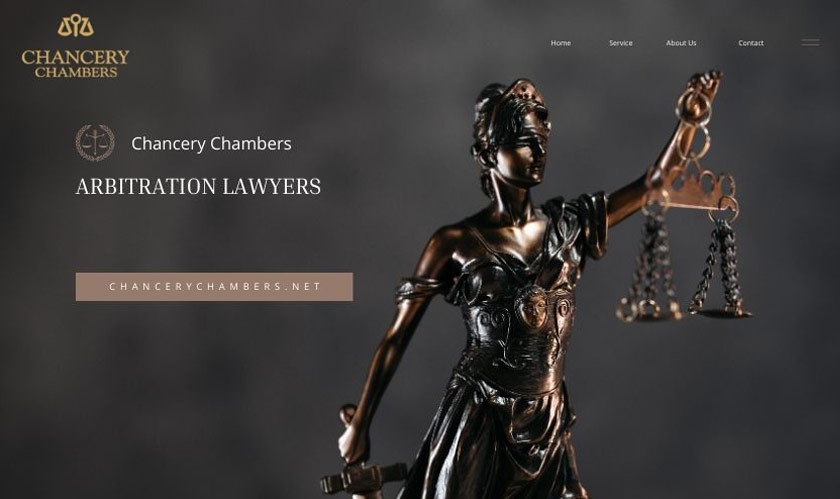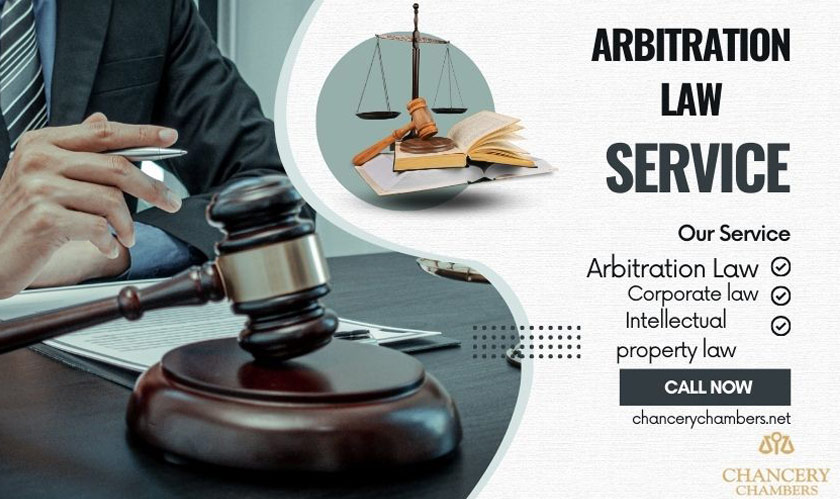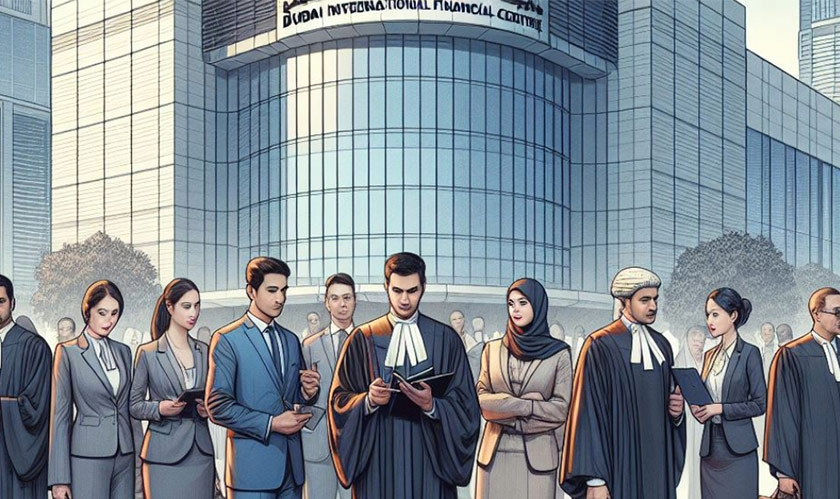Are you Looking for arbitration lawyers in Dubai? or Dubai Arbitration Lawyers Agency? Then You are in the right place. Welcome to the Chancery Chambers. Arbitration lawyers have become increasingly popular in the UAE in recent years due to the implementation of a strong arbitration law that is comparable to global ADR regimes. This has made Dubai, UAE one of the most sought-after locations for international commercial arbitration. Chancery Chambers has a wealth of experience in dealing with arbitration cases before leading international and national arbitral bodies such as the Dubai International Arbitration Center (DIAC), the Dubai International Financial Centre , and other leading international arbitral bodies.

It’s a big deal in the new law of the United Arab Emirates on arbitration. It lays down the rules to ensure fairness and impartiality of arbitration. This is why people are trusting the Chancery Chambers in the United Arab Emirates to settle disputes, bringing in companies and investors from all over the world.
Our Arbitration Lawyers in Dubai
At Chancery Chambers, our team of seasoned arbitration lawyers in Dubai is dedicated to providing comprehensive assistance to our clients at every stage of the arbitration process. From drafting arbitration agreements to the actual conduct of arbitration proceedings, whether domestic or international, we offer strategic counsel and representation tailored to our client’s specific needs and objectives.
The Dubai International Arbitration Centre (DIAC) stands out as a leading arbitral institution in the region, offering state-of-the-art facilities and a comprehensive set of rules that align with international best practices. Chancery Chambers is well-versed in navigating the DIAC’s arbitration procedures, ensuring that our clients receive efficient and effective resolution of their disputes.
In addition to the DIAC, the Dubai International Financial Centre Courts (DIFC) play a pivotal role in arbitration in Dubai. As a recognized hub for international business and finance, the DIFC Courts offer a sophisticated legal framework that caters to the specific needs of businesses engaged in complex cross-border transactions. Our expertise in navigating the DIFC Courts’ arbitration landscape enables us to deliver optimal client outcomes.
International arbitration in Dubai has surged in recent years owing to the UAE’s commitment to fostering a pro-arbitration environment. Chancery Chambers is at the forefront of this burgeoning landscape, offering our clients the expertise and understanding needed to navigate the complexities of international arbitration in Dubai.
Why Choose Chancery Chambers?
- Experienced Professionals: Our arbitration lawyers in Dubai are highly experienced in handling a wide range of arbitration cases, ensuring effective representation for our clients.
- Customized Solutions: To ensure the best possible outcome in arbitration proceedings, we offer personalized legal solutions that are tailored to each client’s particular needs and objectives.
- Expertise in Arbitration Law: Our lawyers have strong expertise in the field of arbitration, making it possible for them to deal with complicated legal matters and advise clients effectively.
- Proven Track Record: With a proven track record of success in arbitration cases, our firm has earned a reputation for delivering favourable outcomes for our clients.
- Strategic Approach: We take a strategic approach to arbitration, carefully analyzing each case and developing a customized strategy to achieve the desired result.
- Client-Centric Service: At Chancery Chambers, client satisfaction is our top priority, and we are committed to providing responsive and attentive service throughout the arbitration process.
Our Arbitration Law Services
A wide range of legal services aimed at resolving disputes outside of traditional court proceedings are covered by arbitration lawyers’ services in Dubai. These services usually involve the use of a neutral third party, known as an arbitrator, who assesses the arguments and evidence put forward by either side and delivers binding or non-binding decisions.

Here are some key aspects of arbitration law services:
- Arbitration Agreements: Arbitration agreements, which define the terms under which disputes will be settled in arbitration instead of litigation, are drawn up by lawyers for clients.
- Dispute Resolution: Clients in arbitration proceedings are provided with advice and representation by lawyers, who help them to navigate the procedures efficiently as well as pursue their interests.
- Arbitrator Selection: The selection of arbitrators with appropriate expertise and experience in the dispute may be assisted by lawyers for their clients.
- Arbitration Proceedings: During arbitration hearings, lawyers prepare and present arguments, evidence, or witnesses in support of their clients.
- Enforcement of Arbitration Awards: The lawyers shall assist their clients in enforcing the award, whether through legal proceedings or other means following an arbitration decision.
- Appeals and Challenges: Arbitration awards may be subject to appeal or challenge in certain cases. Throughout this process, legal professionals shall represent and advise the parties.
- International Arbitration: The complexity of the relevant laws and procedures is handled by lawyers who have experience in International Arbitration when it comes to disputes between parties from various countries.
Expertise in Dubai Arbitration Law
The Chancery Chambers of Dubai, UAE have an unparalleled reputation in the field of arbitration law, which they navigate with ease and precision through a complex legal landscape. To ensure the best possible results for our clients, our experienced team of professionals combines deep industry knowledge with a comprehensive understanding of local law. We have a track record of success in resolving complex disputes, and we are one of the finest law firms in Dubai when it comes to arbitration.

Here are some points explained
Personalized Legal Solutions
In the area of arbitration law, the Chancery Court offers personalized legal solutions. We can provide you with tailored guidance at every step of your journey, whether it’s resolving disputes or dealing with the complexities of law.
Transparent Fee Structure
Discover clarity in our arbitration services with Chancery Chambers. In navigating arbitration law, our transparent fee structure ensures fairness and simplicity. You can count on us to provide you with simple solutions that are tailored to your needs.
Proven Track Record in Arbitration Law
The Chancery Chambers has a distinguished history of excellence in the field of arbitration, with 10 years of successful cases under its belt. With each arbitration case, our experienced team of legal experts brings unparalleled knowledge and expertise that will lead to a swift and fair resolution for our clients. The Chancery Chambers continues to be a trusted choice for all arbitration matters because of its track record which is marked by integrity, professionalism, and dedication.
Arbitration Process Explained by Chancery Chambers
At Chancery Chambers, we simplify the arbitration process to help you navigate legal matters efficiently. Arbitration is a method of resolving disputes outside of court. Here’s how it works:
- Agreement: Parties agree to resolve disputes through arbitration.
- Selection: Arbitrators are chosen by both parties or appointed by a designated institution.
- Hearing: Both sides present their case and evidence in a private hearing.
- Decision: The arbitrator(s) make a binding decision, known as an award.
- Enforcement: The award is legally enforceable in court if necessary.
Arbitration offers a quicker, confidential, and cost-effective alternative to traditional litigation.
YOUR ARBITRATION EXPERT ADVOCATE

Name: Mr. Abdul Rahman
Role: Senior Arbitration Advocate
Experiences: 14+ Years
Education: Holds a Master’s degree in International Arbitration
Location: Dubai, UAE
Bio: Having 14+ years of experience in the field, has solved more than 260 Arbitration issues through litigation.
Clients: 267
Our Other Services in Dubai, UAE
- Mergers And Acquisitions
- Debt Recovery Lawyer
- Civil And Commercial Litigation
- Company Incorporation
- Legal Drafting
- Legal Due Diligence
- Commercial Safeguards
- Trust/ Foundation Creation
- Intellectual Property Registration
- Will In Dubai
- Maritime Contracts And Disputes
- Real Estate, Rental &Construction
- Labour Lawyer
- Family Law
- Criminal Lawyer
Choose reliability, choose our Arbitration Law services for swift resolutions.
Let our experienced team guide you through Arbitration Law complexities. Contact Now. “
Connect With Us for Better Experience in Law Field
FAQs
1. What does an arbitration lawyer in Dubai do?
An arbitration lawyer helps you settle disputes without going to court by representing you before institutions like DIAC or DIFC. They guide you through agreements, hearings, evidence, and enforcement to ensure the best outcome.
2. How can arbitration benefit businesses and individuals seeking to resolve disputes?
Speed & Efficiency – Timetables are agreed up-front, avoiding congested court dockets.
Subject-Matter Expertise – Parties can appoint arbitrators with deep industry knowledge (construction, energy, tech, shipping, etc.).
Confidentiality – Sensitive commercial information, trade secrets, or reputational issues stay out of the public domain.
Cross-Border Enforceability – Awards are recognised in 170+ Convention states, often more easily than foreign court judgments.
Procedural Flexibility – Tailored disclosure, virtual hearings, and language choice reduce cost and complexity.
Finality & Predictability – Limited appeal grounds provide closure and make settlement values easier to forecast.
3. What are the key steps involved in the arbitration process?
Arbitration Agreement / Clause – Usually built into the contract; may also be signed post-dispute (submission agreement).
Notice of Arbitration – The claimant serves formal notice and files with the chosen institution (or appoints an arbitrator in ad hoc cases).
Constitution of the Tribunal – Parties or the institution appoint one or three arbitrators; conflict disclosures are vetted.
Preliminary Conference – The Tribunal and parties set the procedural timetable, pleadings schedule, document-production scope, and hearing dates.
Written Pleadings & Evidence – Statements of claim/defence, witness statements, expert reports, and limited discovery.
Hearing – Oral testimony, cross-examination, and legal submissions (often a week or less for commercial cases).
Post-Hearing Briefs (optional) – Clarify complex factual or quantum issues.
Deliberation & Award – The tribunal issues a reasoned, binding decision; time limits vary by rules (e.g., 6 months under DIAC).
Enforcement / Set-Aside – The award can be enforced locally or abroad; challenges are limited to procedural defects or public policy violations.
4. How do I choose the right arbitrator for my case, and what criteria should I consider?
CriterionWhy It MattersPractical Tip
Subject-Matter Expertise Increases efficiency; reduces the need for expert explanations Check CVs, published awards, and industry background
Legal Qualification & Jurisdictional Experience Familiarity with governing law and seat influences quality of reasoning Look for dual qualifications (e.g., English & UAE law) where relevant.
Independence & Impartiality is Mandatory under most rules; conflicts can invalidate awards Review prior appointments, party connections, and disclosures.
Availability & Responsiveness: Delays occur if the arbitrator is overbooked. Ask for the current caseload; institutions now publish availability statistics.
Language Proficiency Misunderstandings add cost and risk Match tribunal language to documentary evidence and witness fluency.
Reputation for Efficiency Strong case-management skills save time & money Search institutional rankings, peer feedback, and enforcement track record.
Fee Structure Arbitrator fees vary widely Compare institutional schedules versus ad hoc hourly rates.
5. What types of disputes are typically resolved through arbitration, and are there any limitations to their applicability?
Commonly Arbitrated Matters
- Commercial contracts: supply, distribution, sale of goods, shareholder or JV agreements
- Construction & infrastructure: delay claims, defects, EPC contracts (FIDIC)
- Energy & natural resources: upstream PSCs, joint-operating agreements, offtake disputes
- Mergers & acquisitions: purchase-price adjustments, earn-outs, warranty breaches
- Intellectual property & tech licensing (particularly cross-border)
- Maritime & shipping: charter party, cargo damage, shipbuilding
- Finance & investment treaties: investor-state arbitrations (ICSID, UNCITRAL)
Key Limitations
Cost in Small Claims – For low-value disputes; institutional fees may outweigh benefits; specialised small-claim rules can mitigate.
Non-Arbitrable Subject Matter – Criminal liability, specific family law issues, and matters of public policy (e.g., nationality status) are reserved for state courts in most jurisdictions.
Third-Party Rights – Parties who never consented to the arbitration clause (e.g., subcontractors, guarantors) generally cannot be compelled to arbitrate.
Interim Injunction Power – Tribunals can order conservatory measures, but enforcement may still require court support.
Why should I choose arbitration instead of going to court in the UAE?
Arbitration is faster, confidential, and often more cost-effective than court litigation. It’s especially beneficial for commercial, construction, and cross-border disputes plus the UAE’s arbitration-friendly laws make the process smooth and enforceable.
How can Chancery Chambers help me with arbitration in Dubai?
Our team has deep experience with DIAC, DIFC, and international arbitration rules. We handle everything from drafting agreements to representing you in hearings ensuring strategic, personalised, and result-driven solutions.
What types of disputes can be resolved through arbitration?
Arbitration is ideal for commercial disputes, construction matters, real estate conflicts, partnership disagreements, financial disputes, and international business issues. If it involves contracts, arbitration is usually the best route.
Why choose Chancery Chambers as your arbitration lawyers in Dubai?
With 14+ years of experience, 260+ arbitration cases, and expertise in DIAC & DIFC frameworks, we deliver quick, reliable, and favourable outcomes. Our personalised approach, transparent fees, and proven track record set us apart.


 Back
Back
